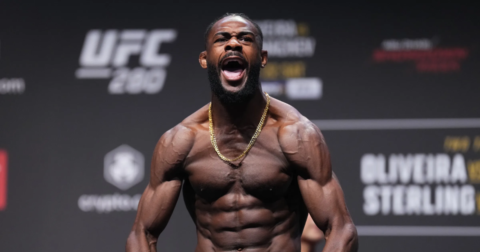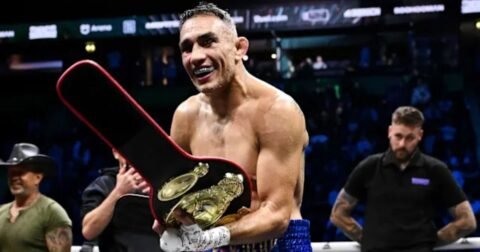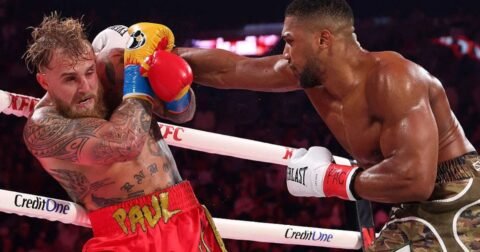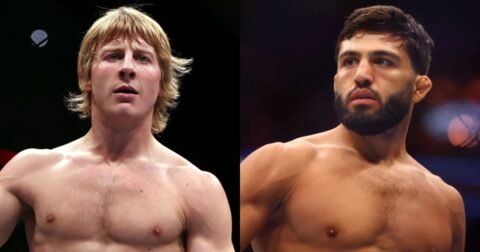Colby Covington, renowned for his unapologetic MAGA persona, has transformed into one of the most polarizing figures in the UFC. As a fierce supporter of Donald Trump, Covington’s UFC heel persona has captivated fans and critics alike, perfectly encapsulating his brash, confrontational style. His rivalry with Kamaru Usman, characterized by trash talk and heated exchanges, solidified his status as a must-watch fighter. However, recent observations by UFC analyst Paul Felder suggest that Covington may be struggling to uphold the fierce image he’s cultivated. This apparent dissonance between his public persona and private interactions raises questions about the authenticity of his character and whether the MAGA personality he embodies is beginning to falter under scrutiny.
Colby Covington’s controversial character has made waves in the mixed martial arts community, especially through his association with the MAGA ideology. This UFC heel identity not only distinguishes him from his peers but has also been a key factor in his rise to fame within the sport. Critics, including fellow fighters and analysts like Paul Felder, are now examining the legitimacy behind Covington’s brash demeanor and its implications on his career. The intense competition with rivals, particularly Kamaru Usman, showcases the dramatic stakes involved while also hinting at the evolving nature of his personal interactions. As peers witness a shift in Covington’s behavior, it prompts a broader conversation about the authenticity of personas within competitive sports.
Colby Covington’s Struggle to Maintain His MAGA Persona
Colby Covington, known for his polarizing persona within the UFC, has carved out a unique niche by embracing a MAGA personality that resonates with a segment of his fan base. However, analysts have pointed out that maintaining such a character, especially one built on brashness and controversy, becomes increasingly challenging over time. With a record of 17-5 in MMA and a history of contentious rivalries, Covington has capitalized on this persona to elevate his profile in a sport that thrives on theatrics and rivalries. Yet, recent observations suggest a possible shift in how he presents himself both in and out of the octagon.
The UFC landscape is notorious for its heel personas, with fighters like Covington often stepping into roles that promote storytelling beyond mere competition. The Kamaru Usman rivalry exemplifies this as Covington targeted Usman not just as an opponent, but as a foil to his larger-than-life character. However, as his career progresses, there are concerns that he may be struggling to reconcile his public image with his private self, leaving fans questioning the authenticity of his MAGA-centric persona.
Moreover, Paul Felder’s scrutiny sheds light on the delicate balance Covington must maintain as he continues his journey in the UFC. To sustain a heel persona means constantly re-engaging with confrontational rhetoric, yet being seen as respectful towards former rivals challenges that narrative. Recent encounters, including a cordial interaction with Kamaru Usman, have raised eyebrows, as they contrast starkly with Covington’s previously aggressive antics. Fans and experts alike are left wondering if this change signals a deeper struggle within Covington regarding the authenticity of his character.
Ultimately, this trajectory hints at the challenges faced by UFC fighters who adopt extreme personas for popularity. The industry rewards flamboyance and controversy, but such approaches require unwavering commitment to maintain, particularly as fighters like Covington mature in their careers. As he approaches the later stages of his time in the octagon, the question lingers—can Covington continue to embody the MAGA personality without appearing disingenuous?
Paul Felder’s Critical Analysis of Covington’s Character
Fighter and analyst Paul Felder has made some compelling observations about Colby Covington’s character, expressing skepticism about the authenticity of Covington’s brash persona. Felder’s insights suggest that Covington may not genuinely embody the heel mentality he publicly projects. For instance, Felder recounted a recent interaction where Covington respectfully acknowledged Kamaru Usman, raising questions about whether his confrontational words are merely a facade constructed for publicity. These moments indicate a potential identity crisis for Covington as he tries to uphold a bravado that may not reflect his true self.
Felder’s comments on Covington have sparked debate about the nature of UFC personas, especially those characterized by hyper-aggression. He articulated concerns that Covington’s transition from trash-talking rival to respectful competitor demonstrates a discord between his public persona and actual character. This inconsistency could lead to disengagement from fans who prefer the unapologetic bravado associated with Covington’s earlier years, complicating his marketing as a fighter in an increasingly competitive environment.
Furthermore, Felder suggests that Covington’s current struggles signify an often-overlooked reality in sports entertainment: the toll that maintaining an extreme persona can take on an athlete’s mental and emotional state. As Covington reconciles his past actions with the present, the imminent question arises—how long can he sustain the MAGA personality if it doesn’t align with his true sentiments? The dichotomy between his public persona and personal behavior has sparked discussions in the MMA community about the necessity and impact of such personas on fighters’ lives beyond the arena.
As Colby Covington navigates the latter stage of his career, the fanbase’s loyalty may hinge on his capacity to balance entertainment with authenticity. If Covington can embrace his past while evolving as a fighter and individual, he might yet redefine his image and, ultimately, influence the dynamics of the UFC in ways that align with both his brand and personal growth.
The Impact of Persona on Fighter Popularity in the UFC
In the UFC, a fighter’s persona can significantly influence their popularity and marketability. Colby Covington exemplifies this notion, as his embrace of the contentious MAGA persona has allowed him to stand out in a crowded field. The balance of being a heel has drawn media attention and fan engagement, making Covington one of the sport’s most recognizable figures. However, the dynamics of persona management are delicate; a shift in behavior, as seen through recent interactions with rivals, could potentially alienate fans drawn to his previously abrasive style.
When comparing Covington with other fighters such as Kamaru Usman and Paul Felder, it’s clear that the dynamics of persona and rivalry play a crucial role in shaping narratives within the UFC. While some fighters lean into their personas for longevity and cohesion, Covington’s apparent struggle highlights the challenges of keeping a thinly-veiled facade intact. This dilemma points to a broader conversation about the sustainability of such personas in a sport that values both authenticity and entertainment.
Moreover, the evolution of success for fighters like Covington often demands adaptability—skills that go beyond physical combat. As the UFC continues to evolve, fighters are becoming increasingly aware of how their words and actions resonate with both fans and their personal brand. Covington’s attempts to juggle his notorious MAGA persona with moments of respect, especially towards former foes, shed light on this complex relationship between personal authenticity and public persona.
This nuanced interplay suggests that maintaining a heel persona in the UFC is not simply about trash-talking and antagonism; it also requires reflection and the ability to navigate personal growth. As fans become more critical, the expectation for genuine interactions may challenge established personas, compelling fighters like Covington to reconsider their approach in a sport that constantly demands more than just athletic prowess.
Colby Covington’s Transition: From Heel to Respectful Contender
Colby Covington’s journey through the UFC has seen him transition from an overt heel persona to moments of unexpected respectfulness that challenge the stereotypes associated with his character. This journey is significant, especially in a sport where athletes often rely on confrontation to draw in audiences. His support for the MAGA movement has positioned him firmly in the spotlight as a controversial figure, but as noted by analysts, he appears to be grappling with the authenticity of that public image. Recently, interactions with Kamaru Usman demonstrated a departure from the trash-talking image that initially catapulted him to fame, leaving many to wonder what this means for his career trajectory amidst an evolving fighting landscape.
This transition is not only notable for Covington but also mirrors the broader trends in the UFC, where various fighters are reshaping the narratives around their personas. As fans look for authenticity, Covington’s challenge remains: can he authentically integrate respect for rivals into his persona? The UFC market thrives on narratives that are compelling and real, and if Covington intends to sustain a long-term career, finding common ground between being a respectful contender and maintaining a heel persona may prove essential.
What’s more, Covington’s potential shift in demeanor brings up crucial discussions about the expectations placed on fighters within the context of performance and persona. Analysts suggest that as athletes grow older, they may seek to redefine their public personas to reflect personal changes and maturity. This scenario could signify a pivotal moment for Covington, who at this stage in his career must decide how he wants to be perceived—both by fans and peers. If the malevolent, brash character he projected was merely a marketing strategy, then there might be a compelling narrative to reshape it in favor of a more mature, balanced representation of himself.
As Covington faces these complexities, the ongoing dialogue surrounding his evolution may provide insights into the fighter’s path ahead. Whether he emerges as an enduring figure within the UFC as a respected competitor or remains locked in a cycle of contradictions will likely depend on how successfully he navigates the multi-faceted nature of identity in professional sports.
Key Points
| Key Points | Details |
|---|---|
| Colby Covington’s Heel Persona | Covington embraces a controversial persona based on support for Donald Trump, significantly increasing his popularity as a welterweight fighter. |
| Questioning Authenticity | UFC analyst Paul Felder expresses concerns about the authenticity of Covington’s character, suggesting that he shows respect to opponents in private interactions. |
| Shift in Behavior | Recent instances such as Covington greeting Kamaru Usman and interactions with Paddy Pimblett show a different, more respectful side of him compared to his public persona. |
| Struggles to Maintain Persona | Felder believes Covington’s MAGA persona is fading as he may be struggling with authenticity, especially as he ages and approaches retirement. |
| Conclusion on Covington’s Persona | The analysis indicates Covington might be using his ‘MAGA’ persona for relevance, suggesting that his authenticity and aggressive character may not align with his true self. |
Summary
Colby Covington’s MAGA persona, once a defining aspect of his fighting career, now appears to be in contention as he navigates the complexities of authenticity and public perception. While he has successfully leveraged his political positioning and controversial statements to gain popularity in the UFC, recent observations from analysts like Paul Felder reveal an individual struggling to maintain that persona in personal interactions. This evolution highlights the challenges faced by personalities like Covington, who must balance the need for showmanship with their true selves as they approach the twilight of their careers. The future may see a more genuine Colby Covington, one who ultimately sheds the exaggerated theatrics of his MAGA persona.







